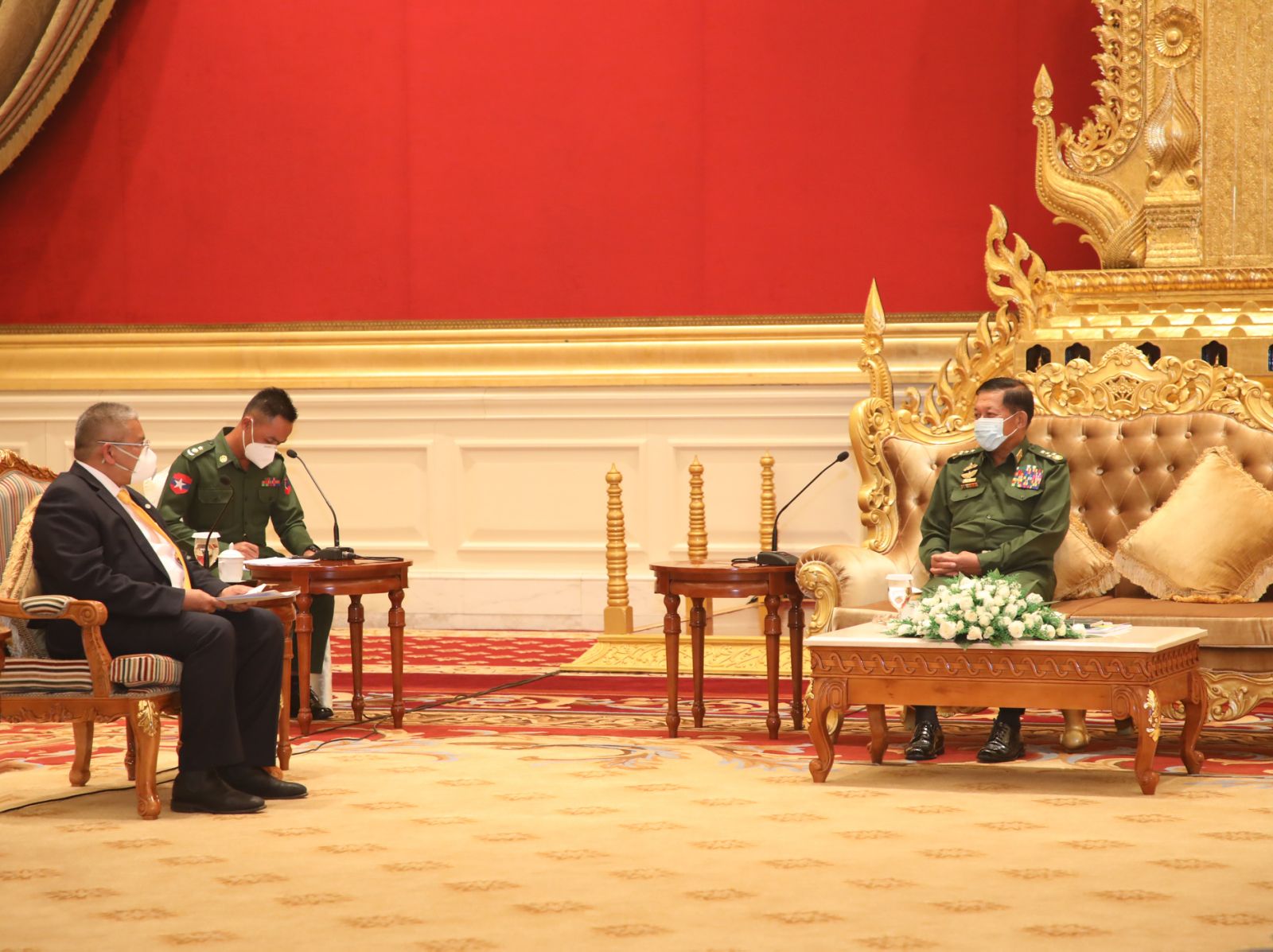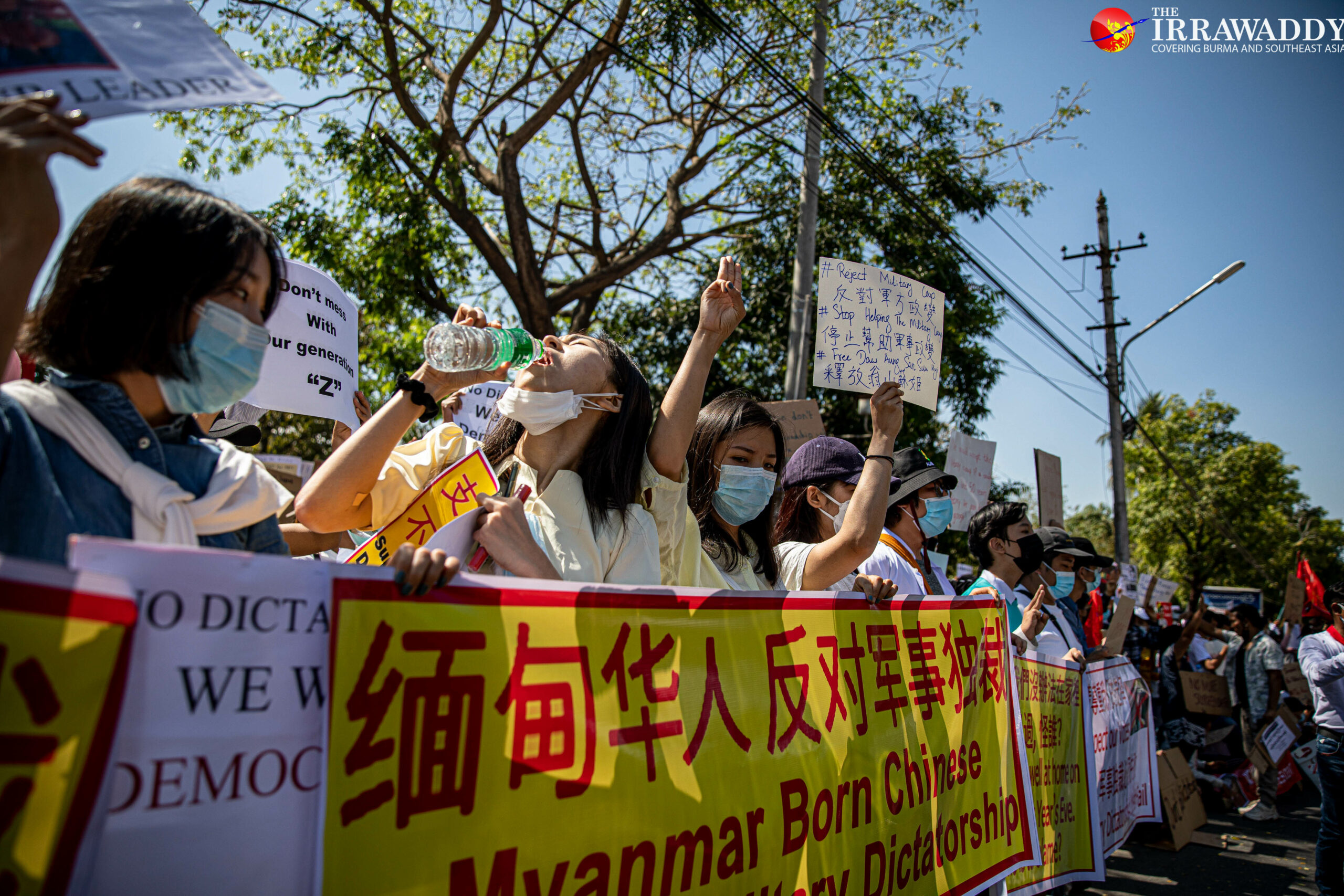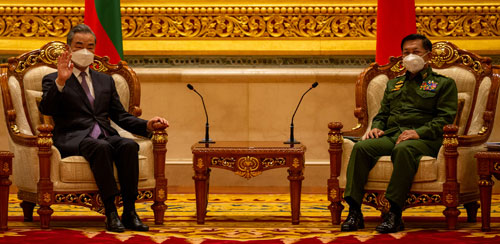The ongoing instability and chaos in Myanmar pose a serious threat to the country’s neighbors, including China. In the days after the coup, anti-China sentiment spread quickly in Myanmar with daily protests mounted against the Chinese Embassy in Yangon and other Chinese facilities.
Last month, Myanmar’s self-defense forces also threatened to attack a facility near Mandalay that forms part of the China-Myanmar oil and gas pipeline. Beijing’s staunch backing for the regime, particularly its diplomatic support on the UN Security Council (UNSC), arouses anger among the Myanmar public, most of whom see China as an untrustworthy neighbor.
Given the strength of anti-China feeling in the country, Beijing will have to treat the Myanmar issue carefully. China can’t be seen as providing legitimacy to the military rulers.
Chinese Ambassador Chen Hai met with coup maker Senior General Min Aung Hlaing in Naypyitaw on Saturday. According to a post on the Chinese Embassy’s Facebook page, he stressed to the general that as Myanmar’s neighbor, China “will continue to play a constructive role”. The statement adds: “China sincerely hopes for the [quick] restoration of peace and stability in Myanmar and supports the implementation of [the] consensus by ASEAN and Myanmar,” referring to a five-point “consensus” among ASEAN members, reached at a special summit in Jakarta in late April, on the steps needed to begin resolving the crisis in Myanmar.

Minutes after the embassy’s message was posted, people inside and outside the country responded with a flood of angry and otherwise negative comments about China on social media.
In February, amid growing anti-China protests in Myanmar, the Chinese ambassador came out to say that “the current development in Myanmar is absolutely not what China wants to see,” though, as is common with Chinese diplomatic statements, he left room for interpretation. He also dismissed rumors that China had aided the military, saying he hoped people could “distinguish right from wrong and guard against political manipulation, so as to avoid undermining the friendship between the two peoples.”
On Friday, ASEAN Secretary-General Lim Jock Hoi of Brunei and Bruneian Foreign Affairs Minister Erywan Yusof met the senior general in Naypyitaw to discuss the Jakarta summit. Brunei is the current chair of ASEAN.
After the summit, the sultan of Brunei, in a statement issued in his capacity as ASEAN chair, announced the leaders’ five-point consensus calling for: 1) the immediate cessation of violence in Myanmar; 2) constructive dialog among all parties concerned to seek a peaceful solution in the interests of the people; 3) mediation to be facilitated by an envoy of ASEAN’s chair, with the assistance of the secretary-general; 4) humanitarian assistance provided by ASEAN’s AHA Center; and 5) a visit by the special envoy and delegation to Myanmar to meet all parties concerned.
But the regime has so far been noncommittal on all five of these feeble points. During the meeting with Snr-Gen Min Aung Hlaing, the delegation provided the names of the special envoys to be appointed to Myanmar under ASEAN. The bloc also called on the regime to free political prisoners. Earlier, the absence of a strong position on this issue had caused dismay among human rights activists and opponents of the coup.
But ASEAN faces its own internal conflict. Indonesia and Thailand are at loggerheads over the matter, according to several diplomatic sources within the bloc.
One of the hurdles to implementing the five-point plan has been a lack of consensus within the bloc on who should be appointed as the special envoy, and what their role and mandate should be.
Indonesia, the region’s most populous nation, initially favored a single envoy to lead a task force while Thailand, whose military has close ties to neighboring Myanmar, pushed for a “friends of the chair” body of multiple representatives, the sources told Reuters. A compromise supported by most ASEAN states was for three envoys, most likely comprising representatives from Thailand, Indonesia and Brunei, the report said.
The Myanmar junta has yet to make any commitments, but it is understood that it wanted ASEAN to come and hear what the military leaders had to say.
Oddly, last week Washington’s No. 2 diplomat said the US remained confident in ASEAN’s five-point consensus plan.
The vote of confidence from Deputy Secretary of State Wendy Sherman stood in sharp contrast to downcast remarks by unnamed ASEAN diplomats quoted in a news report a day earlier who claimed the bloc was “hemorrhaging” amid internal sniping over the matter, according to the South China Morning Post.
Last week, speaking to regional journalists, Sherman acknowledged frustration over the lack of progress, saying “we all wish results would take place yesterday”.
But “we also understand that sometimes diplomacy needs to take time to make sure that all the ducks are in a row [so that] we can proceed forward and reach success,” Sherman said in the telephone briefing.
Meanwhile, in a sign of its deep frustration and disappointment with ASEAN, Myanmar’s parallel civilian National Unity Government said it had lost faith in the bloc, as it had failed to engage with both sides, ignoring the NUG’s approaches and only engaging with the junta.
On the topic of ASEAN, it’s time for some frank talk.
It is wrong to expect anything from ASEAN. It’s no secret that Myanmar regimes past and present effectively used the bloc as a shield, knowing that ASEAN could be relied upon to do nothing. (When Myanmar began to open up in 2012, ASEAN leaders were quick to take credit, claiming their policy of engagement was bearing fruit.) In reality, ASEAN did nothing for all of the long decades during which the country lived under its previous dictatorial regimes, allowing the bloc’s own non-democratic members to continue with their own oppressive actions undisturbed.
On Sunday, the regime’s Foreign Minister U Wunna Maung Lwin flew to Chongqing, China to attend the ASEAN-China Summit.
Questions are being asked over whether China’s strategy is to use ASEAN as tool to legitimize the regime. If that is the case, one can predict more anti-China sentiment in Myanmar, and for the boycott of Chinese investment to intensify.
China appears resigned to the fact that its efforts to cultivate a relationship with Daw Aung San Suu Kyi’s government were for naught, and is prepared to cut its losses.

It is about time the leadership in Beijing spoke up more candidly on the reality in Myanmar and changed its policy on its neighbor to the south before Myanmar’s instability and chaos have serious negative impacts on China. Why? Unlike the regime that came to power after the coup in 1988, the current junta has been unable to control or manage the population, administer the country, prevent the rise of a new armed insurrection, contain widespread public discontent or save the economy. The chaos in Myanmar poses a serious risk to Chinese infrastructure investment in the country.
Anti-regime protesters have been calling on the international community not to recognize the junta or its governing body, the State Administrative Council. However, China has not denounced the coup and has prevented UNSC intervention while looking to influence ASEAN.
The illegitimate coup and the chaotic state of affairs in Myanmar have negatively impacted every aspect of Sino-Myanmar relations. If China endorses the murderous regime, an uprising against China inside Myanmar will follow.
You may also like these stories:
Daw Aung San Suu Kyi’s Trial to be Completed Within Six Months
Myanmar Junta Hired Mon People to Join Coup Leader at Bridge Ceremony
Myanmar Daily Post-Coup Update: June 5-6

















